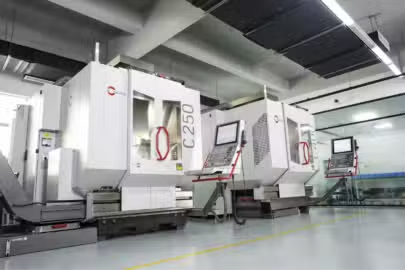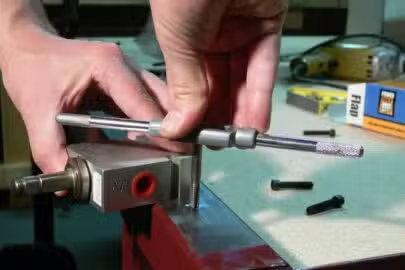CNC (Computer Numerical Control) machine shops are essential in transforming raw materials into intricate and precisely engineered components in the rapidly evolving world of precision machining. As these workshops remain at the cutting edge of technological advancements, the demand for skilled CNC machinists is more significant than ever. Individuals and businesses in this industry seek recognition of their expertise and commitment to quality through CNC machine shop certifications in their pursuit of excellence.
CNC Machine Shop Certifications refer to various industry-specific certifications that a CNC (Computer Numerical Control) machine shop can obtain to demonstrate its commitment to quality, compliance with industry standards, and adherence to specific regulations.
In this article, we look into CNC machine shop certifications, investigating their significance and how they contribute to the overall landscape of precision manufacturing.
Introduction to CNC Machine Shop Certifications
CNC Machine Shop Certifications are formal acknowledgments granted to individuals or companies within the CNC machining industry, signifying a high level of expertise, adherence to industry standards, and a commitment to quality in precision manufacturing. These certifications are earned through assessments conducted by relevant certifying bodies or organizations and indicate the holder’s proficiency in operating, programming, and maintaining CNC machines.
Typically, CNC Machine Shop Certifications cover a range of skills and competencies related to CNC machining processes, such as CNC milling, CNC turning, and programming. They may also extend to certifications for specific software, machinery brands, or industry-specific standards.
These certifications play a crucial role in the CNC machining landscape by providing a standardized and recognized measure of competence. They serve as valuable credentials for individuals, showcasing their capabilities to potential employers or clients. For businesses, holding CNC Machine Shop Certifications can enhance their reputation, instill confidence in clients, and ensure that they meet or surpass industry standards for precision and quality in manufacturing.
Importance of Quality Standards in Manufacturing

There are several advantages of quality standards in manufacturing. Here are some of the advantages:
Achieving Precision
Precision in CNC machining refers to the ability to produce parts with consistency and accuracy. It ensures that parts meet the required specifications and work properly. Precision requires precise control of cutting tools, workpieces, and machine components to achieve the desired surface finish, dimensions, and tolerances.
The CNC machine programming you use must precisely control the movement of the cutting tools, ensuring that they move along the correct paths and cut the appropriate amount of material to achieve the desired finish. To ensure proper fit, the part must be manufactured to exact specifications. It may not fit if it is too big or too small, causing problems during assembly.
Even minor deviations from the specifications can cause problems and impact the finished product’s quality. Precision assists you in achieving the desired finish when a product has a specific requirement. Deviations from specifications, no matter how minor, can lead to a finished product that fails to perform its intended function. These deviations can lead to safety risks, product failures, and costly recalls.
Increasing Cost-Efficiency
Quality control helps to reduce costs by reducing material waste. Material is a significant expense in CNC machining, so it must be used cost-effectively and wisely. You must select a material that best meets the specifications and design of the product. To avoid material waste, avoid overspecifying or oversizing the material.
Reduce and minimize material waste by using standard sizes, nesting your parts, and reusing scraps. You can also reduce waste and use materials better using near-net-shape blanks or pre-machining processes like forging or casting.
Maintains Consistency and Compliance
Quality control ensures that a high-quality product is consistently produced across batches. If you are inconsistent, the quality of your product will constantly fluctuate, yielding different results each time. Failure to comply with industry standards can be costly to your business because it affects product quality and raises demand for products in short supply.
Implement strict quality control procedures by performing checks before, during, and after manufacturing. Both consistency and compliance are critical in maintaining a dependable supply chain and meeting customer demands.
Reduces Downtime
Downtime is classified into two types: planned and unplanned. When you prepare for the machine to be down during operation hours for maintenance, this is known as planned downtime. When your machine unexpectedly and inconveniently stops working, this is unplanned downtime. Downtime can be very costly to your business, reducing efficiency and product output.
Emergency machine repairs can also be more expensive than routine maintenance. Unplanned downtime is also a safety concern. A faulty machine can cause an employee to be injured. Unplanned downtime halts your operations, lengthening lead times and impairing your ability to deliver to your customers.
With strict quality control, you can monitor machine performance and identify when maintenance is necessary. Frequent maintenance keeps it operating as it should, minimizing unscheduled downtime. Production disruptions can be reduced when you anticipate your machine’s maintenance.
Improves Customer Satisfaction and Reputation
Complying with customer requirements is a crucial aspect of quality assurance. Your clients have specifications for the goods they purchase. Adopting quality assurance procedures aids in making sure that the products meet these specifications. Customers will recognize the value of your services as quality control reduces the likelihood of a defective product.
A quality control procedure can also facilitate the early detection of issues in the production process. Customers can be informed of these issues as soon as possible, allowing you to tell them in advance of any delivery delays. Meeting the needs of your clients regularly enhances your business’s reputation.
Overview of Key Industry Certifications

Here are some of the key industry certifications:
ISO 9001 Quality Management
The widely-accepted ISO 9001 standard specifies the needs for a quality management system. It is applicable to any business, regardless of size or sector. The fundamental goal is to ensure that a firm continuously offers products and services that suit the needs of its customers and the requirements of the regulatory authorities.
Key Components
- Emphasis on customer satisfaction.
- Implementation of a robust quality management system.
- Continuous improvement of processes.
Significance
- Enhances customer satisfaction.
- Improves operational efficiency.
- Demonstrates a commitment to quality and continual improvement.
AS9100 Aerospace Standard
AS9100 is a standard developed for the aerospace manufacturing, building upon ISO 9001. It includes additional requirements unique to the aerospace sector to ensure the safety, reliability, and regulatory compliance of products and services in the aerospace and defense industries.
Key Components
- Focus on risk management and product safety.
- Stringent requirements for traceability and documentation.
- Emphasis on configuration management.
Significance
- Ensures compliance with aviation, space, and defense industry regulations.
- Enhances product safety and reliability.
- Facilitates global market access in the aerospace sector.
H3 ISO 13485 Medical Devices
ISO 13485 is an international standard specifically designed for busi esses involved in the design, production, installation, and servicing of medical devices. It sets out requirements for a quality management system to ensure the safety and effectiveness of medical devices.
Key Components
- Focuses on risk management in the medical device lifecycle.
- Stringent requirements for documentation and traceability.
- Emphasis on compliance with regulatory requirements for medical devices.
Significance
- Ensures the quality and safety of medical devices.
- Facilitates compliance with regulatory requirements.
- Enhances the credibility of organizations in the medical device industry.
ITAR Compliance
ITAR(nternational Traffic in Arms Regulations) is a set of US government laws that govern the import and export of defense-related goods and services on the US Munitions List (USML). ITAR compliance is essential for companies involved in the defense and aerospace industries.
Key Components
- Strict control over the export of defense-related technologies.
- Classification of items on the USML.
- Implementation of secure processes to prevent unauthorized access to controlled information.
Significance
- Ensures national security by regulating the export of defense-related technologies.
- Imposes controls on the transfer of sensitive information to foreign entities.
- Non-compliance can result in severe penalties, like fines and imprisonment.
Other essential industry certifications are:
ISO 14001 Environmental Management
ISO 14001 is an international standard that identifies the requirements for an environmental management system. It provides a framework for organizations to minimize their environmental impact, comply with applicable legal requirements, and continually improve their environmental performance.
Key Components
- Environmental issues and consequences are identified and managed.
- Compliance with environmental laws and regulations.
- Commitment to pollution prevention and sustainable practices.
Significance
- Demonstrates commitment to environmental responsibility.
- Reduces environmental risk and waste.
- Enhances reputation among environmentally conscious stakeholders.
ISO 45001 Occupational Health and Safety
ISO 45001 is the standard for occupational health and safety management systems. It gives a framework to identify, control, and minimizethe risks associated with health and safety within the workplace.
Key Components
- Hazard identification and risk assessment.
- Establishment of health and safety objectives.
- Implementation of preventive measures and continual improvement.
Significance
- Enhances workplace safety and reduces accidents.
- Demonstrates commitment to employee well-being.
- This can lead to regulatory compliance and improved operational performance.
Validating CNC Machining Capabilities

There are several methods of validating CNC machining capabilities. These validation methods collectively contribute to the robustness of CNC machining capabilities, ensuring precision, reliability, and compliance with quality standards.
First Article Inspections
First Article Inspections (FAI) represent a cornerstone in the validation of CNC machining capabilities. This meticulous process comprehensively examines the initial production piece to ensure alignment with precise design specifications. Key components of FAIs include dimensional verification, confirming material adherence, and a functionality check to ensure the part operates as intended.
The significance lies in its role as a safeguard against potential manufacturing standard issues, providing a crucial baseline for ongoing quality control. By identifying and rectifying problems early in the production process, FAIs contribute significantly to the overall reliability of CNC machining.
Gauge R&R Studies
In the realm of CNC machining, the reliability and consistency of measurement systems are paramount. Gauge Repeatability and Reproducibility (Gauge R&R) studies systematically evaluate measurement tools for accuracy and consistency. Repeatability assesses the tool’s ability to produce consistent results with repeated measurements, while reproducibility evaluates consistency across different operators and equipment.
Through statistical analysis, Gauge R&R studies ensure the reliability of measurements and identify and quantify sources of variation within the measurement system. This meticulous approach enhances confidence in measurement accuracy and contributes to the overall precision of CNC machining.
Process Capability Analysis
Process Capability Analysis is a pivotal method for evaluating the inherent variability of a CNC machining process. By employing statistical tools such as Cp, Cpk, and control charts, this analysis assesses the process’s ability to produce rapid prototyping parts within specified tolerances consistently. Key components include statistical scrutiny of the process, analyzing the distribution of produced parts against specified tolerances, and identifying opportunities for process enhancement.
The significance of Process Capability Analysis lies in its role in continuous improvement initiatives, ensuring the CNC machining process consistently meets design specifications and maintains high performance and consistency.
Part Traceability
Part Traceability is a comprehensive approach to tracking and documenting the journey of individual parts throughout the CNC machining process. This involves assigning unique identifiers such as serial numbers or barcodes to each component, maintaining traceability logs, and tracking parts from raw material throughout manufacturing.
The significance of Part Traceability extends beyond quality control; it facilitates a rapid response to quality issues or recalls, ensures compliance with industry regulations and standards, and enhances overall product quality and safety. By providing a complete picture of a part’s lifecycle, Part Traceability contributes to a transparent and accountable CNC machining process.
Role of Continuous Improvement

Continuous improvement plays a crucial role in the success and sustainability of companies across various industries. Here’s an exploration of its key aspects and significance:
Enhancing Efficiency
Continuous improvement involves identifying and eliminating inefficiencies within processes. Organizations can streamline operations, reduce waste, and enhance efficiency by regularly evaluating workflows and procedures. This efficiency gain often leads to cost savings and improved resource utilization.
Quality Enhancement
A fundamental aspect of continuous improvement is the pursuit of higher quality standards. Regular assessment and process adjustments help identify and rectify defects, errors, or deviations from quality standards. This focus on quality satisfies customer expectations and contributes to brand reputation and customer loyalty.
Innovation Promotion
Continuous improvement is closely linked to innovation. It encourages organizations to explore new technologies, methodologies, and creative solutions to problems. By fostering an environment that values experimentation and learning from failures, continuous improvement becomes a catalyst for innovation.
Customer Satisfaction
The relentless pursuit of improvement is often driven by the desire to meet or exceed customer expectations. An industry that continuously enhances its products, services, and processes is better positioned to deliver value to customers. Satisfied customers contribute to brand loyalty and positive word-of-mouth.
Risk Mitigation
Continuous improvement involves regular risk assessments and proactive measures to mitigate potential issues. By identifying and addressing risks early in the process, companies can prevent problems from escalating, ensuring operational continuity and resilience.
Considering Certifications When Selecting a CNC Supplier

When selecting a CNC supplier, carefully evaluate their certifications in alignment with the specific requirements of your industry and projects. Here are some tips to help:
Define Your Requirements
Clearly outline your project requirements and industry standards. Understand the certifications relevant to your needs, whether 9001 for general quality management or specialized standards like AS9100 for aerospace.
Research Industry Standards
Familiarize yourself with industry-specific certifications and standards. Different sectors have unique requirements, so knowing the standards that apply to your industry helps identify the most suitable CNC suppliers.
Check for Regulatory Compliance
If your projects involve specific regulations, such as defense-related work, ensure that the CNC supplier complies with regulations like ITAR. This is crucial for maintaining legal and regulatory integrity in sensitive projects.
Verify Certification Relevance
Ensure that the certifications held by the CNC supplier align with your project requirements. Some certifications may be more general, while others are industry-specific. Verify that the certifications are relevant to your specific needs.
Assess Certification Renewal
Check the consistency of certification renewal. Certifications should be up-to-date, indicating the CNC supplier’s ongoing commitment to maintaining and improving standards. Regularly updated certifications are a positive sign of a commitment to quality.
Consider Specialized Certifications
In addition to general quality management certifications, assess whether the CNC supplier holds specialized certifications relevant to your projects. For instance, certifications specific to medical devices (ISO 13485) or aerospace (AS9100) may be crucial for particular applications.
Conclusion
In CNC machining services, certifications are the cornerstone of trust, signifying a commitment to excellence and adherence to rigorous industry standards. As we’ve explored the significance of certifications such as ISO 9001, AS9100D, ISO 13485, and critical ITAR compliance, it becomes evident that these certifications are not just accolades but promise quality and reliability.
Zintilon stands out with pride, holding the esteemed certifications of ITAR, ISO 9001:2015, and ISO 13485:2016. These certifications speak volumes about Zintilon’s dedication to precision, quality, and compliance across various industries. Choosing Zintilon for CNC machining services means aligning your projects with a provider that goes beyond promises. These certifications are not merely a mark of achievement but a pledge to consistently elevate standards and surpass client expectations. Contact us today to get started!
Read More
- 3 Axis CNC Machining vs. 5 Axis CNC Machining – Zintilon
- Revolutionizing Production: The Dynamics of Digital Manufacturing – Zintilon
- Types of Aluminum: Properties, Benefits, and Applications – Zintilon
- Everything You Need to Know About CNC Turning – Zintilon
- Which CNC Machining Services are Best for Metal Fabrication? – Zintilon




